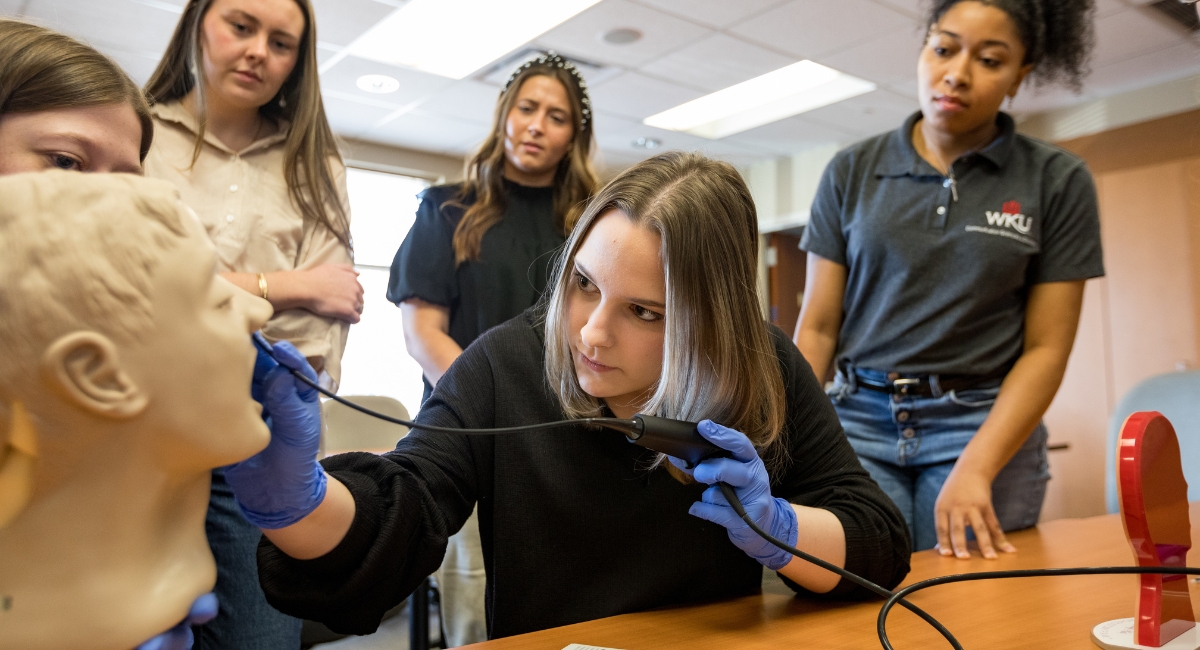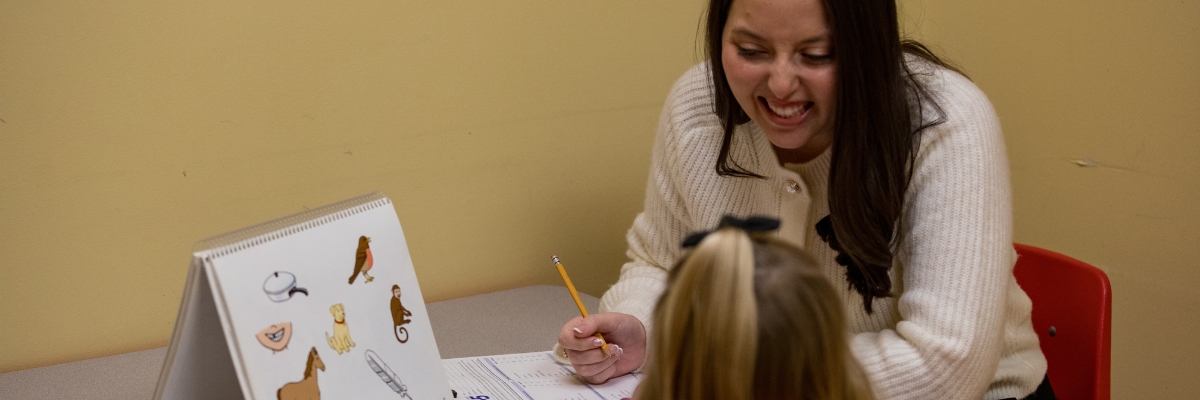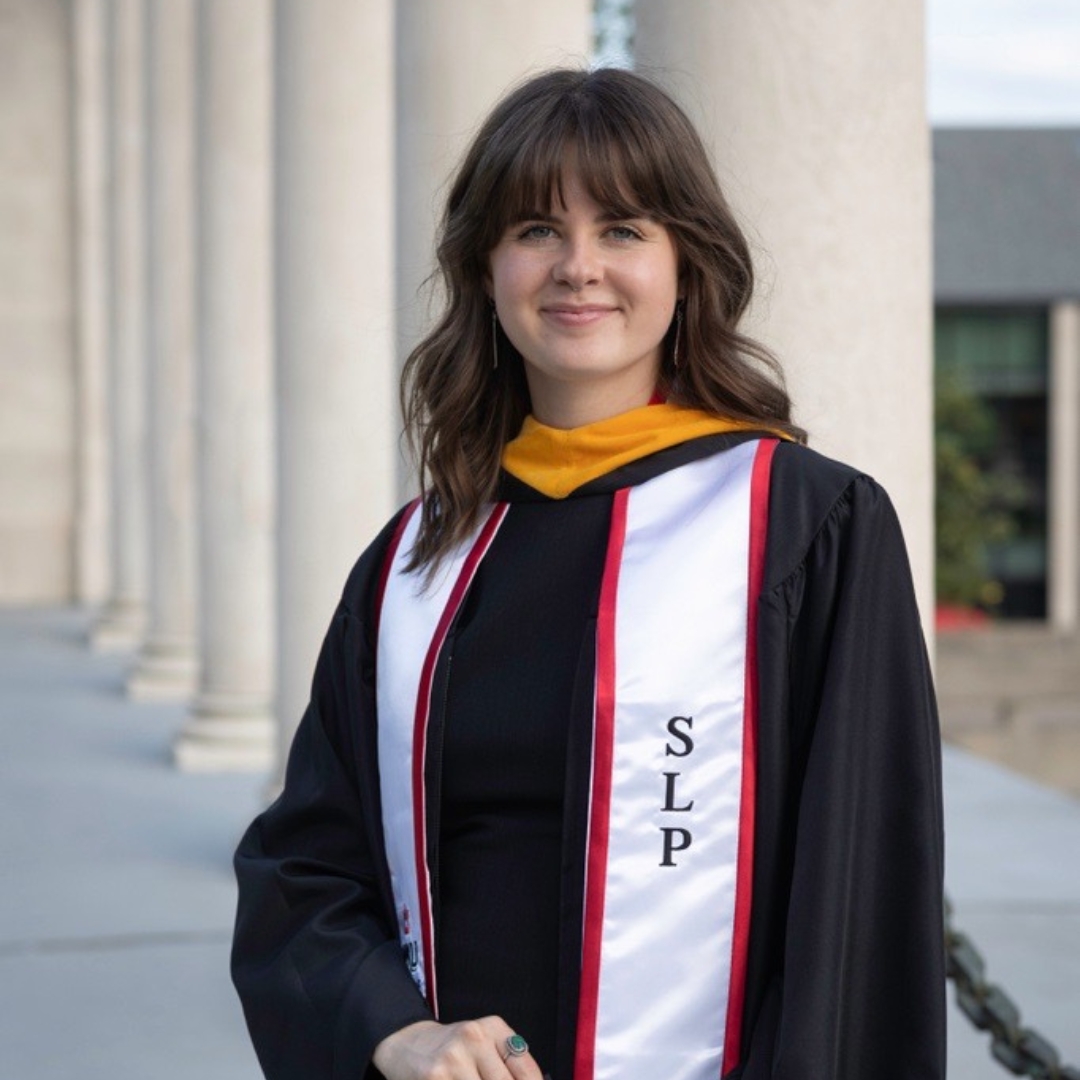Communication Disorders, Bachelor of Science (595P, 595)
- Undergraduate
- Bachelor of Science
- Health and Human Services
- Communication Sciences & Disorders
Overview
The B.S. (Bachelor of Science) education program in Communication Disorders at Western Kentucky University prepares students academically for graduate study in speech-language pathology, audiology, or related areas. A master's degree is required for national certification in speech-language pathology and a clinical doctorate is required for national certification in audiology. Licensure is also necessary in Kentucky but other states have various mandates for practicing professionals. All coursework follows guidelines recommended by the American Speech-Language-Hearing Association.
CAREER OPPORTUNITIES IN COMMUNICATION DISORDERS
Speech-Language Pathology career opportunities are expected to grow faster than average through the end of calendar year 2022. This is due to several factors including an aging baby boomer population with increased possibilities of oncoming neurological disorders with accompanying speech, language, swallowing, and hearing impairments. Employment opportunities are also increasing due to improving survival rates of premature infants and trauma and stroke patients in need of assessment and intervention. Additionally, federal legislation guarantees services to all children with disabilities. Private practice opportunities will also increase due to the increase in contracted services with schools, nursing care/rehabilitation facilities and hospitals.
Program Requirements (58 hours)
A baccalaureate degree requires a minimum of 120 unduplicated semester hours. More information can be found at www.wku.edu/registrar/degree_certification.php.
Students who began WKU in the Fall 2014 and thereafter should review the Colonnade requirements located at: https://www.wku.edu/colonnade/colonnaderequirements.php.
The major for students in Communication Disorders (reference number 595P prior to being accepted to the program and reference number 595 after being officially accepted to the undergraduate program) is a pre-professional program that requires 58 hours in the specialization areas of speech-language pathology and audiology. All courses follow guidelines recommended by the American Speech-Language-Hearing Association (ASHA). Prior to selecting Colonnade courses, you must obtain approval from your Communication Sciences and Disorders Department academic advisor to ensure selected courses meet requirements set forth by ASHA.
The undergraduate program prepares students academically for graduate study in speech-language pathology, audiology, or related areas. A master’s degree is needed for national certification in speech-language pathology and an audiology doctorate is needed for audiology. Majors in Communication Disorders are encouraged to apply for graduate programs by December of their senior year, including to the Western Kentucky University Master of Science program in Speech-Language Pathology. Licensure is also necessary in Kentucky but other states have various mandates for practicing professions following the Master of Science program.
Those interested in a Major in Communication Disorders should have sophomore status (30 hours) prior to beginning the first year of the program, be officially admitted to WKU, and submit:
- Most recent transcript (including the Fall semester grades) documenting a minimum cumulative GPA of 3.0; and
- A completed application, (including the Essential Functions and Technical Standards documentation) for official admission to the program (found on departmental website); and
- CD 280, CD 290, and CD 347 are prerequisite courses for admission to CD 595 major.
Applications for admission into the undergraduate major are accepted until February 15. Students admitted during March of any given year will begin major coursework during the fall semester following admission. Due to the clinical practicum component of this major, enrollment to the undergraduate program is limited.
Additional required courses may be used to fulfill both Colonnade and Communication Disorders program requirements.
| Code | Title | Hours |
|---|---|---|
| Specialization Areas | ||
| CD 280 | Introduction to Communication Sciences and Disorders | 3 |
| CD 290 | Guided Clinical Observations | 1 |
| CD 347 | Science of Speech and Hearing | 3 |
| CD 348 | Introduction to Clinical Research and Writing in Communication Sciences and Disorders | 3 |
| CD 405 | Applied Phonetics | 3 |
| CD 478 | Survey of Clinical Conditions in Communication Sciences and Disorders | 3 |
| CD 481 | Speech and Language Development | 3 |
| CD 482 | Audiology | 3 |
| CD 483 | Articulation and Phonological Disorders | 3 |
| CD 484 | Speech Anatomy and Physiology | 3 |
| CD 485 | Introduction to Assessment in Communication Disorders | 3 |
| CD 486 | Language Disorders | 3 |
| CD 487 | Aural Rehabilitation | 3 |
| CD 488 | Augmentative Communication Systems | 3 |
| CD 489 | Communication Disorders in Aging | 3 |
| CD 490 | Prelinguistic Assessment and Intervention Approaches | 3 |
| CD 491 | Management of Communication Disorders in Schools | 3 |
| CD 492 | Neuroanatomy in Communication Sciences and Disorders | 3 |
| Internship | ||
| Students must complete 6 hours of internship | ||
| CD 495 | Clinical Internship | 6 |
| Total Hours | 58 | |
Additional Required Courses
| Code | Title | Hours |
|---|---|---|
| Statistics | ||
| Select one of the following: | 3 | |
MATH 183 | Introductory Statistics | |
PH 383 | Biostatistics in the Health Sciences | |
SOCL 300 | Social Statistics | |
Other advisor approved course | ||
| Chemistry or Physics | 3-4 | |
PHYS 130 | Acoustics of Music and Speech (or any CHEM course) | |
| Psychology or Psychological Science | 3 | |
PSY 100 | Introduction to Psychology (or any PSYS course) | |
| Biology | ||
| BIOL 131 | Human Anatomy and Physiology | 4 |
| ENG 300 | Writing in the Disciplines | 3 |
| Total Hours | 16-17 | |
All undergraduate students are required to complete supervised clinical clock hours working with people having communication disorders. Students will be required to undergo criminal background checks and provide proof of a recent physical examination, professional liability insurance, and a tuberculin skin test prior to beginning any clinical experiences, which must be updated annually. It is the responsibility of the student to ensure that all university requirements are met to participate in clinical experiences. Students may be responsible in part or in full for any costs incurred to meet such requirements.
Finish in Four Plans
Finish in Four Plan
| First Year | |||
|---|---|---|---|
| Fall | Hours | Spring | Hours |
| COMM 145 (F-OC) | 3 | ENG 100 (F-W1) | 3 |
| PSY 100 or PSYS 100 (F-SB)1 | 3 | HIST 101 or HIST 102 (E-SB) | 3 |
| MATH 183 (F-QR)1 | 3 | CD 2802 | 3 |
| Arts and Humanities (E-AH) | 3 | CD 2902 | 1 |
| BIOL 131 (E-NS, SL)1 | 4 | CD 3472 | 3 |
| Minor/General Elective or World Language (if needed) | 3 | ||
| 16 | 16 | ||
| Second Year | |||
| Fall | Hours | Spring | Hours |
| ENG 200 (F-AH) | 3 | ENG 300 (F-W2)1 | 3 |
| CHEM ### * (any Chemistry course) or PHYS 130 | 3 | Connections: Social & Cultural (K-SC) | 3 |
| Minor/General Elective | 3 | Connections: Local to Global (K-LG) | 3 |
| Minor/General Elective | 3 | Connections: Systems (K-SY) | 3 |
| Minor/General Elective | 3 | Minor/General Elective | 3 |
| 15 | 15 | ||
| Third Year | |||
| Fall | Hours | Spring | Hours |
| CD 405 | 3 | CD 483 | 3 |
| CD 481 | 3 | CD 485 | 3 |
| CD 482 | 3 | CD 486 | 3 |
| CD 484 | 3 | CD 487 | 3 |
| CD 348 | 3 | CD 478 | 3 |
| 15 | 15 | ||
| Fourth Year | |||
| Fall | Hours | Spring | Hours |
| CD 490 | 3 | CD 488 | 3 |
| CD 491 | 3 | CD 489 | 3 |
| CD 492 | 3 | CD 495 | 3 |
| CD 495 | 3 | Minor/General Elective | 3 |
| Minor/General Elective | 3 | Minor/General Elective | 1 |
| 15 | 13 | ||
| Total Hours 120 | |||
- 1
These courses are required as part of the curriculum requirements for the major.
- 2
Prerequisite courses before program admission.
Colonnade: For more details and courses offered in the Colonnade General Education program visit the website.
World Language Requirement: Language Proficiency of novice-high before completing 60 credit hours is required (or completion of 2nd level of a language). Two credits (or equivalent) of a single world language in High School satisfies this WKU requirement.




